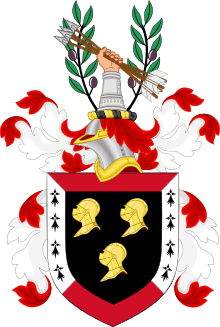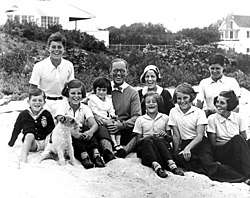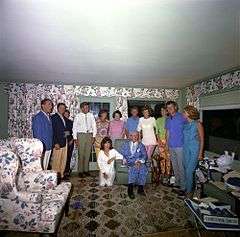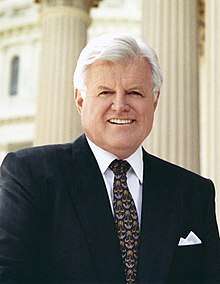Kennedy family
The Kennedy family is an American political family that has long been prominent in American politics, public service, entertainment, and business. The first Kennedy elected to public office was Patrick Joseph "P. J." Kennedy in 1884, 35 years after the family's arrival from Ireland. He served in the Massachusetts state legislature from 1884 to 1895. At least one Kennedy family member served in federal elective office in every year from 1947, when P. J. Kennedy's grandson, John F. Kennedy, became a member of Congress from Massachusetts; to 2011, when P. J. Kennedy's great-grandson, Patrick J. Kennedy, retired as a member of Congress from Rhode Island, a span of 64 years.[1]
| Kennedy | |
|---|---|
| Political family | |
 Coat of arms granted to President John F. Kennedy in 1961 by the Chief Herald of Ireland Gerard Slevin | |
 The Kennedy Family at Hyannis Port, Massachusetts in 1931 | |
| Parent family | O'Kennedy |
| Current region | New England |
| Place of origin | Knigh Castle, County Tipperary, Ireland |
| Founded |
|
| Founder | Patrick Kennedy (1823–1858) |
| Titles | List
|
| Estate(s) | Kennedy Compound (Hyannis Port, Massachusetts) |
The descendants of P. J.'s son, Joseph P. Kennedy Sr., and Rose Fitzgerald Kennedy include President John F. Kennedy (who had also served in the United States Congress), U.S. Attorney General Robert F. Kennedy (who later served in the U.S. Senate), four other members of the United States House of Representatives or Senate, and two U.S. ambassadors, a lieutenant governor, three state legislators (one of whom went on to the U.S. House of Representatives), and one mayor.
In addition, Joseph Sr. and Rose's daughter, Eunice, founded the National Institute of Child Health and Human Development (a part of the National Institutes of Health), and founded the Special Olympics. Eunice's daughter Maria Shriver served as First Lady of California.[2] Other descendants of Joseph and Rose Kennedy have been active as lawyers, authors, and activists on behalf of those with physical and intellectual challenges.
History
According to genealogist Brian Kennedy in his work JFK's Irish O'Kennedy Ancestors, the Kennedys who would go on to play a significant role in the United States of America originated from the Ó Cinnéide Fionn (one of the three Irish Gaelic Ó Cinnéide clans who ruled the kingdom of Ormond, along with the Ó Cinnéide Donn and Ó Cinnéide Ruadh). Their progenitor, Diarmaid Ó Cinnéide Fionn, held Knigh Castle close to what is today Puckane, County Tipperary in 1546. From there, having lost out to the New English order in the Kingdom of Ireland, they ended up in Dunganstown, New Ross, County Wexford by 1740. Patrick Kennedy was born there in 1823.
The first Kennedys to reside in the United States were Patrick Kennedy (1823–1858) and Bridget Murphy (1824–1888), who sailed from Ireland to East Boston in 1849; Patrick worked in East Boston as a barrel maker, or cooper.[3] Patrick and Bridget had five children: their youngest, Patrick Joseph "P. J." Kennedy, went into business and served in the Massachusetts state legislature from 1884 to 1895.
P. J. and Mary Augusta Hickey were the parents of four children. Their oldest was Joseph Patrick "Joe" Kennedy Sr.,[4] who amassed a fortune in banking and securities trading, which he further expanded by investing in other growing industries. Joseph Sr. was appointed by President Franklin D. Roosevelt as the first chairman of the Securities and Exchange Commission, chairman of the Maritime Commission, and U.S. Ambassador to the United Kingdom in the lead-up to World War II. He served on The Hoover Commission, officially named the Commission on Organization of the Executive Branch of the Government, from 1947 to 1949; the commission was appointed by President Harry Truman to recommend administrative changes in the federal government.
Continued public service
Joseph P. Kennedy Sr. and Rose Elizabeth Fitzgerald were the parents of nine children: Joseph Jr., John, Rose Marie (called Rosemary), Kathleen, Eunice, Patricia, Robert, Jean, and Edward (called Ted). John served as the 35th President of the United States, while Robert and Ted both became prominent senators. Every Kennedy elected to public office has served as a Democrat, while other members of the family have worked for the Democratic Party or held Cabinet posts in Democratic administrations. Many have attended Harvard University, and the family has contributed greatly to that university's John F. Kennedy School of Government.
Joseph Sr. expected his eldest son, Joseph Jr., to go into politics and to ultimately be elected president. Joseph Jr. was elected as a delegate to the 1940 Democratic National Convention, and enlisted in the Navy after the U.S. entered World War II. Joseph Jr. was killed in 1944 when the bomber he was piloting exploded in flight. It then fell upon John, who had considered a career as a journalist — he had authored a book and did some reporting for Hearst Newspapers — to fulfill his father's desire to see the family involved in politics and government. After returning from Navy service, John served in the U.S. House of Representatives representing Massachusetts's 11th congressional district from 1947 to 1953, and then as U.S. Senator from Massachusetts until his election as President in 1960.
During John's administration, Robert served as attorney general; his brother-in-law Sargent Shriver served as director of the new Peace Corps, and Ted was elected to the U.S. Senate, occupying his brother's former seat in Massachusetts until his death in 2009. Among the Kennedy administration's accomplishments: the Alliance for Progress, the Peace Corps, peaceful resolution to the Cuban Missile Crisis, the Nuclear Test Ban Treaty of 1963, the 24th Amendment ending the poll tax, and the Civil Rights Act of 1964.[5] The family was the subject of intense media coverage during and after the Kennedy presidency, often emphasizing their relative youth, allure, education, and future in politics. Ted served in the Senate with his brother Robert (1965–1968), and was serving in the Senate when his nephew, Joseph P. II (1987–1999), and son, Patrick J. (1995–2011), served in the U.S. House of Representatives.
In November 2012, Joseph P. Kennedy III, son of former Rep. Joseph P. Kennedy II and grandson of the late Sen. Robert F. Kennedy, was elected to the U.S. House of Representatives from Massachusetts's 4th congressional district.
Kennedy curse

Family incidents led Senator Ted Kennedy to wonder, in a televised statement about the Chappaquiddick incident in 1969, whether there really was a "Kennedy curse." Some of the events endured by the Kennedy clan include: in 1941, Rosemary underwent a non-consensual lobotomy intended to prevent her from embarrassing the family with her violent mood swings, convulsions, and intellectual disability. The operation left her incapacitated for the rest of her life. Joseph Jr. died in 1944 when the Navy bomber he was piloting exploded in mid-flight. Kathleen died in a plane crash in France in 1948. John and Robert were assassinated, in 1963 and 1968 respectively. In 1964, Ted was nearly killed when his plane crashed in an apple orchard near Southampton, Massachusetts.[6][7] (Legislative aide Edward Moss and the pilot were killed in the crash.)[8] Ted was seriously injured and spent months in a hospital recovering from a severe back injury, a punctured lung, broken ribs and internal bleeding.[9]
In later generations, Robert's son David died of a drug overdose in 1984; and son Michael died from injuries sustained in a skiing accident in 1997; John's son John Jr. died in a plane crash (along with his wife Carolyn and sister-in-law Lauren) off the coast of Martha's Vineyard in 1999; Kara Kennedy and Christopher Kennedy Lawford died of heart attacks, in 2011 and 2018 respectively; and Saoirse Kennedy Hill died of a drug overdose in 2019.[10][11]
In April 2020, Robert's granddaughter Maeve Kennedy McKean, a former official in the Obama Administration, and her eight-year-old son, Gideon Joseph Kennedy McKean, went missing in Chesapeake Bay after embarking in a canoe to retrieve a ball. They were presumed dead after not being found within 26 hours.[12] Maeve and Gideon's bodies have since been recovered.[13]
Genealogy
Notes:
|
Government offices held
- Patrick Joseph Kennedy: Massachusetts state Representative 1884–1889; Massachusetts state Senator, 1889–1895.
- Joseph Patrick Kennedy Sr.: Chairman of the U.S. Securities and Exchange Commission, 1934–1935; chairman of the United States Maritime Commission, 1936–1938; United States Ambassador to the United Kingdom, 1938–1940.
- John Fitzgerald Kennedy: United States Representative from Massachusetts, 1947–1953; United States Senator from Massachusetts, 1953–1960; President of the United States, 1961–1963
- Caroline Kennedy: United States Ambassador to Japan, 2013–2017.
- Eunice Kennedy Shriver
- Bobby Shriver: Santa Monica, California City Council member, 2004–2012; Mayor of Santa Monica, 2010.
- Mark Kennedy Shriver: Maryland state Delegate, 1995–2003.
- Robert Francis Kennedy: United States Attorney General 1961–1964; United States Senator from New York, 1965–1968.
- Kathleen Kennedy Townsend: Lieutenant governor of Maryland, 1995–2003.
- Joseph P. Kennedy II: United States Representative from Massachusetts, 1987–1999.
- Joseph P. Kennedy III: United States Representative from Massachusetts, 2013–present.
- Jean Kennedy Smith: United States Ambassador to Ireland, 1993–1998.
- Edward Moore Kennedy: United States Senator from Massachusetts, 1962–2009.
- Edward M. Kennedy Jr.: Connecticut state Senator, 2015–2019.
- Patrick J. Kennedy: Rhode Island state Representative, 1989–1993; United States Representative from Rhode Island, 1995–2011.
- John Fitzgerald Kennedy: United States Representative from Massachusetts, 1947–1953; United States Senator from Massachusetts, 1953–1960; President of the United States, 1961–1963
- Joseph Patrick Kennedy Sr.: Chairman of the U.S. Securities and Exchange Commission, 1934–1935; chairman of the United States Maritime Commission, 1936–1938; United States Ambassador to the United Kingdom, 1938–1940.
Since John F. Kennedy's election to the U.S. House of Representatives in 1946, members of the family have held public office continuously with very few exceptions — first from December 22, 1960 until January 20, 1961 (from Kennedy's resignation from the Senate to his taking office as president) and next from Patrick J. Kennedy's departure from the House on January 3, 2011 until Joseph P. Kennedy III's election to the House on January 3, 2013.
Heraldry
In 1961, John F. Kennedy was presented with a grant of arms for all the descendants of Patrick Kennedy (1823–1858) from the Chief Herald of Ireland. The design of the arms (three gold closed helmets on a black field)[14] strongly alludes to symbols in the coats of arms of the O'Kennedys of Ormonde and the FitzGeralds of Desmond, from whom the family is believed to be descended. The crest is an armored hand holding four arrows between two olive branches, elements taken from the coat of arms of the United States of America and also symbolic of Kennedy and his brothers.[15]
 |
|
References
- Levenson, Michael (February 13, 2010). "Pondering a Congress without Kennedys". The Boston Globe.
- Library, California State. "Governors of California - Maria Shriver". governors.library.ca.gov.
- Maier, Thomas (2003). The Kennedys: America's Emerald Kings. Basic Books. p. . ISBN 978-0-465-04317-0.CS1 maint: ref=harv (link)
- The Kennedy Family The JFK Library, accessed February 10, 2016
- https://www.whitehouse.gov/about-the-white-house/presidents/john-f-kennedy/
- "Teddy's Ordeal". Time. June 26, 1964. Retrieved May 23, 2008.
- "The Luck of the Kennedys". Check-Six.com. May 8, 2008. Retrieved February 24, 2009.
- "John F. Kennedy Jr. – Timeline: Misfortunes of a Family". CNN. July 1999. Archived from the original on March 23, 2008. Retrieved May 23, 2008.
- Swidey, Neil (February 16, 2009). "Chapter 2: The Youngest Brother: Turbulence and tragedies eclipse early triumphs". The Boston Globe. Retrieved February 24, 2009.
- Seelye, Katherine Q.; Martin, Jonathan (August 1, 2019). "Granddaughter of Robert F. Kennedy Dies After Overdose at Family's Compound". The New York Times. Retrieved August 2, 2019.
- "RFK granddaughter, Saoirse Kennedy Hill, died of drug overdose". NBC News. Associated Press. November 1, 2019. Retrieved November 1, 2019.
- Mandell, Andrea (April 4, 2020). "'She was my everything': Read husband's memorial of Kennedy descendant and their 8-year-old son". USA Today. Retrieved April 4, 2020.
- Theresa Waldrop and Rebekah Riess (April 6, 2020). "Maeve Kennedy Townsend McKean's body found by divers". CNN. Retrieved April 7, 2020.
- The General Armory of England, Scotland, Ireland and Wales, Bernard Burke, Harrison & Sons, 1884, pp. 558-9
- "John Fitzgerald Kennedy, 35th President of the United States". American Heraldry Society. Archived from the original on August 3, 2016. Retrieved October 27, 2009.
Bibliography
- Barbara Gibson; Ted Schwartz (1993). The Kennedys : the Third Generation. New York: Kensington Publishing. p. 458. ISBN 9780786010264. OCLC 670288617.
External links
| Wikimedia Commons has media related to Kennedy family. |
- The Kennedys: A Family Tree, St. Petersburg Times
- Kennedy Family Tree, The New York Times
- Kennedy Family, The Political Graveyard


.jpg)
